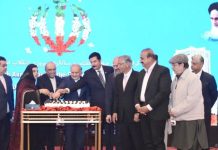- FO spokesperson confirms receiving request of Saeed’s extradition.
- “India seeks Saeed’s extradition in so-called money laundering case.”
- India blames Hafiz Saeed for being involved in cross-border attacks.
ISLAMABAD: India has requested Pakistan to extradite Hafiz Muhammad Saeed, the chief of the banned Jamaatud Dawa (JuD), the Foreign Office confirmed Friday.
“Pakistan has received a request from the Indian authorities, seeking extradition of Hafiz Saeed in a so-called money laundering case,” Foreign Office spokesperson Mumtaz Zahra Baloch said in a statement.
However, there might be no plans to follow up on India’s request, as according to the spokesperson, “no bilateral extradition treaty exists between Pakistan and India”.
India blames Saeed for being involved in attacks across the borders, however, the chief of the banned outfit has denied all claims.
A Pakistani court had sentenced Hafiz Saeed, founder of Lashkar-e-Taiba (LeT), the armed group blamed by the United States and India for the deadly 2008 Mumbai siege, to 31 years in prison in two cases of terrorism financing.
An anti-terrorism court in Lahore had found Saeed guilty of terrorism financing in April 2022 and sentenced him to 32 years in jail.
Hours before Zahra’s confirmation, India had also confirmed it had formally requested Pakistan to extradite Saeed, according to India’s foreign ministry spokesperson Arindam Bagchi.
“We have conveyed a request along with relevant supporting documents to the Government of Pakistan,” Bagchi told reporters in a media briefing.
Saeed conviction in 2022 was not the only one. Arrested in 2019, he was already serving a 15-year sentence after being found guilty of terror financing in 2020.
Saeed, who was put behind bars many times before over the past decade, denies being involved with armed operations, including the 2008 attacks in Mumbai, which killed 166 people.

















